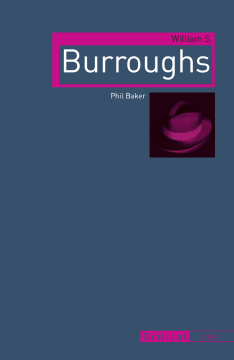
Additional Information
Book Details
Abstract
Along with Jack Kerouac and Allen Ginsberg, William S. Burroughs (1914––97) is an iconic figure of the Beat generation. In William S. Burroughs, Phil Baker investigates this cult writer’s life and work—from small-town Kansas to New York in the ’40s, Mexico and the South American jungle, to Tangier and the writing of Naked Lunch, to Paris and the Beat Hotel, and ’60s London—alongside Burrough’s self-portrayal as an explorer of inner space, reporting back from the frontiers of experience.
After accidentally shooting his wife in 1951, Burroughs felt his destiny as a writer was bound up with a struggle to come to terms with the “Ugly Spirit” that had possessed him. In this fascinating biography, Baker explores how Burroughs’s early absorption in psychoanalysis shifted through Scientology, demonology, and Native American mysticism, eventually leading Burroughs to believe that he lived in an increasingly magical universe, where he sent curses and operated a “wishing machine.” His lifelong preoccupation with freedom and its opposites—forms of control or addiction—coupled with the globally paranoid vision of his work can be seen to evolve into a larger ecological concern, exemplified in his idea of a divide between decent people or “Johnsons” and those who impose themselves upon others, wrecking the planet in the process.
Drawing on newly available material, and rooted in Burroughs’s vulnerable emotional life and seminal friendships, this insightful and revealing study provides a powerful and lucid account of his career and significance.
“Baker’s vivid critical study of the Beat novelist Burroughs zings with the same energy and humor as his subject’s fiction. Judiciously matching the biography to the books, Baker follows Burroughs’s peregrinations from his relationship with Allen Ginsberg and Jack Kerouac in New York, to Mexico, where he accidentally shot dead his wife, and eventually to Tangier, where he wrote his best-known work, The Naked Lunch. A literary life that is as entertaining as it is indispensable as a guide to Burroughs’s writing.”
— Sunday Times“Lucid and readable . . . manages to pick its through way through most of Burroughs’s major motivations and curious obsessions, and serves as a good introductory text for general readers, as well as a model of concision for Beat aficionados. Repeatedly, in various ways, it asks: just what possessed Burroughs?” —Times Literary Supplement
— TLS“Baker’s book is an excellent introduction.”
— Stride Magazine“Obviously researched with some thoroughness, Baker’s finely cut biography of Burroughs hits the spot as well as Burroughs once did in an infamous episode he was involved with down in Mexico City. . . . For all the often nightmarish twists of events in Burroughs life, he is a biographer’s dream. This biography comes up trumps where grander, better placed ones have come up short. The precise, condensed style makes for a fast moving read.” — Beat Scene
Phil Baker is a freelance writer who lives in London. He is the author of The Book of Absinthe: A Cultural History and has reviewed for a number of papers including the Sunday Times, Observer, and the Times Literary Supplement.
